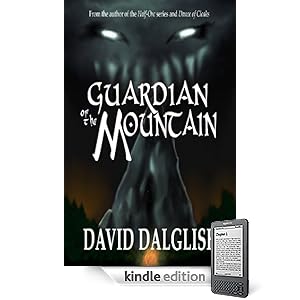Guardian of the Mountain is a short horror-fantasy by David Dalglish. It’s clearly set in the world of the Half-Orcs series but all the characters, bar Mira, are new.
There’s a nice dynamic between the principle POV character, Jerek, and his simpleton friend, Dan. It reminded me of the Harruq/Qurrah relationship from as it started out in The Weight of Blood, although Jerek is not quite as unpleasant as Qurrah, and Dan’s a lot more stupid than Harruq. Stupid in a good way, mind: he’s a very likeable character.
What’s probably more important is that he’s a lot more innocent than Jerek. In fact, Jerek is the most unscrupulous of the bunch which, considering the ending, is a nice twist on the usual morality tale.
The most striking elements of this story, for me, were the effortless pace and the tight point of view. Sentences were short and to the point. Barely a wasted word and generally easy to follow. Naturally, this all helps with the process of image building. There were a few places where a missing speech tag or slightly odd phrasing threw me but they were few and far between.
Dialogue was good – natural and punchy, the way people generally speak in real life. There’s a definite shift towards gritty realism with a liberal spray of expletives. I had mixed feelings about that. I know this is how contemporary people speak, but in a story I prefer the profanities to be saved for maximum impact. In Dalglish’s defence, this sort of language serves to further our impressions of Jerek’s character.
The atmosphere of the story is dark and oppressive. There’s a fatalistic, inexorable feeling about it – the sort you get from films like “Final Destination” and “The Omen”. The scenes in the forest threw up a whole load of cinematic references for me (all of them good): “Predator” and “Deliverance” amongst them. More than that, though, this story had a strong sense of the Brothers Grimm about it – those truly dark and disturbing fairy tales.
It’s almost a negation of a morality story, with a clever dashing of our expectations. It’s also very much about human nature – greed and the will-to-survive. I’m not sure who would have approved the most: Nietzsche or Sartre. There’s a strong feeling that no one ever gets out alive, to say the least.
The Mira component of the story was almost a distraction for me. It was great to see her and to flesh out a bit more back-story (she features in the Half-Orcs series), but it deflected a little from the central plot. Clearly (as the old elf says) others have come to the mountain seeking its gold, and all have met a grizzly end; but when the elf decides he wants Mira and says he could stop the guardian killing everyone else if they’ll hand her over, it raised a lot of questions about the elf’s morality, his purpose and the nature of the mountain and its guardian that were left unanswered.
I think it works – the Mira element – but it perhaps detracts from the standalone status of the story. Clearly there’s a lot more that needs to be told (note: buy books 4 and 5 of the Half Orcs series to find out).
Point of view was maintained throughout. In the past, Dalglish has been a bit of a head-hopper, but not here. We’re pretty much stuck in Jerek’s POV throughout, and it’s not always comfortable. It’s effective, though, as (imperfect as he is) he’s the character most of us are unfortunately likely to identify with the most.
Tension is built expertly and builds in increments until the gripping last moments. There’s also a lot of subverting expectations and toying with the reader (thinking Jerek’s off the hook one minute only to have the heat back on the next).
A story succeeds on its ability to engage the emotions and the imagination. The principle emotion here is fear and Dalglish achieves his aim. The scenes are easy to imagine, the action immediate, the setting easily suggested. There’s no messing around with tedious descriptions of characters and irrelevant details about the colour of their underwear. It’s economical writing, which in this genre equals good writing.
I think this story achieves what it sets out to and it was an easy and entertaining read. Its greatest accomplishment, for me, was the POV of Jerek. Hopefully we’ll get to see some more development of him elsewhere. There’s a subtle Dalgishean (to coin a phrase) hint of redemption about the man...
Rating 4/5


No comments:
Post a Comment